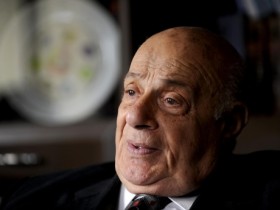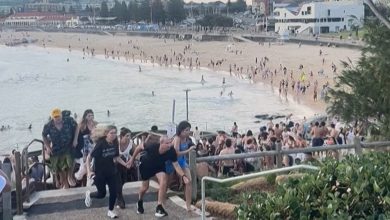Founder of Turkish Cyprus, Rauf Denktas dies at age 88
 Rauf Denktas, the former Turkish Cypriot leader whose determined pursuit of a separate state for his people and strong opposition to the divided island’s reunification defined a political career spanning six decades, has died. He was 88.
Rauf Denktas, the former Turkish Cypriot leader whose determined pursuit of a separate state for his people and strong opposition to the divided island’s reunification defined a political career spanning six decades, has died. He was 88.
Dr. Charles Canver, who treated Denktas for his heart condition, said he died late Friday of multiple organ failure at Near East University Hospital in Lefkosa. He had been in poor health since suffering a stroke last May.
Denktas’s death comes in the middle of yet another diplomatic drive to reunify Cyprus, which has been split along ethnic lines since 1974 when Turkey intervened the island in the aftermath of a short-lived coup by supporters of union with Greece.
Denktas had maintained the Turkish Cypriots needed a separate state to preserve peace and avoid a return to what he called massacres of Turkish Cypriots at the hands of the majority Greek Cypriots.
His dedication to the partitionist cause made him a hero to many Turkish Cypriots, just as Greek Cypriots saw him as their arch-villain – the standard-bearer of all they opposed.
That image began to be molded in the late 1950s when Denktas helped found the Turkish Resistance Organization or TMT as a counterweight to EOKA, a Greek Cypriot group waging a guerrilla campaign against the island’s then colonial ruler Britain to achieve union with Greece.
“Greek Cypriots saw him as the cynical adversary,” said Cyprus University History Professor Petros Papapolyviou. “He was seen as the man who put the interests of Turkey above those of Cyprus.”
Born in Paphos, which is in today’s Greek Cyprus, on Jan. 24, 1924, the London-trained lawyer rose to prominence as a leading figure in the Turkish Cypriot community during the tumultuous period in the 1960s and 1970s when inter-communal conflict claimed hundreds of Cypriot lives.
He blocked efforts to reunite the island, claiming that unification would open the way for Greek Cypriot domination and raise the threat of renewed violence.
After the Turkish intervention, he was chosen as leader of what was then the self-declared Cyprus Turkish Federated State. He proclaimed the independence of the Turkish Republic of Northern Cyprus (KKTC) in 1983, but the state failed to gain recognition from any other country other than Turkey, which maintains some 35,000 troops there.
“He was Mr. KKTC,” said Eastern Mediterranean politics professor Erol Kaymak. “He was very much a man of is time … you could rely on him to stick to the ethno-nationalist line that he believed in.”
A series of United Nations-backed talks to end the island’s division through the 1980s and 1990s went nowhere.
Most of these negotiations pitted Denktas against a familiar adversary – Glafkos Clerides, who was Denktas’s Greek Cypriot counterpart for much of his time in power.
Clerides, like Denktas, is a lawyer, and the two men knew each other from the 1950s when they locked horns in the courtroom with Denktas prosecuting EOKA fighters and Clerides defending them.
Their personal relationship was said to be cordial, even friendly – the two men often cracked jokes as an icebreaker prior to hard bargaining in numerous rounds of peace talks.
But that friendship did not extend as far as the negotiating table, where they were unable to overcome their differences.
Clerides and the Greek Cypriots sought to reunify Cyprus as a single federated state, envisioning a power-sharing arrangement between Cypriots of Turkish and Greek origin.
But Denktas said Greek Cypriots abrogated any right for a renewed partnership under the island’s 1960 constitution when they launched attacks on Turkish Cypriots.
Backed by Ankara and the powerful military establishment whose respect he commanded, Denktas argued for a two-state solution in defiance of international support for a federation.
Denktas’s dominance of Turkish Cypriot politics was reflected in his victory in every presidential election between 1983 and 2000.
But in his later years, many Turkish Cypriots came to view his insistence on a separate state as an obstacle to a settlement that would lift them out of international economic and political isolation and usher them into the European Union that the internationally recognized Greek Cypriots were negotiating with the bloc.
Denktas’s domestic opponents also accused him of bringing in settlers from Turkey who voted for him in exchange for promises of land that had previously belonged to Greek Cypriots.
As thousands of Turkish Cypriots took to the streets in 2003 in support of a settlement coupled with a realignment of Turkish government policy objectives on Cyprus, another round of UN-sponsored talks culminated in 2004 in a reunification plan that Greek Cypriots rejected and Turkish Cypriots endorsed in separate referendums.
Greek Cyprus subsequently joined the EU but only the Greek Cypriots enjoy membership benefits. Nonetheless, Denktas was relieved at the plan’s failure, said Kaymak.
Denktas left politics in 2005 after announcing that he would not seek re-election. But as a respected elder statesman, he continued to be a very vocal supporter of a two-state solution.
“Whatever mistake we committed, the result is a 23-year-old young, dynamic, small Republic which is absolutely necessary for the security and strategic location of Turkey,” Denktas said in 2006.
“No one would like to see the Turkish soldiers to return to Anatolia as if they lost a war … May God save this nation from seeing such a shame,” he said.
Denktas was highly critical of his leftist successor Mehmet Ali Talat’s handling of renewed peace talks that began in 2008 and have made limited progress since. Talat lost a presidential election in 2010 to Denktas protege Dervis Eroglu.
Denktas lost two of his sons, one during surgery and another in a car crash. His surviving son, Serdar, also entered politics and for a while served as prime minister. Denktas, who is survived by his wife Aydin, also had two daughters and 11 grandchildren.



@steve. You must have had a terrible hit on the head recently if you think we have enslaved Arabs. All Arabs supported Ottoman rule. Ottomans where the Caliph and it protected N.Africa for a long time from European powers who commited genocide there such as Libya and Algeria when they took over.
typer its obvious that you are an evil creature lurking around blogs to make comments about people. Go to hell you creep!
Mekani cennet olsun..Onu herzaman sevgi ve saygi ile anacagiz. Onu cok seviyoruz..Memduh ve Almila
Basiniz sag olsun butun ailesine ve butun Turk milletine KKTC inin Kurulcusu birinci cumhurbaskani unutulmaz unutulamaycak. Her zaman kalbimizde bizimle beraber olacak
Ailesine ve Turk ulusuna bas sagligi dileriz. Cok buyuk bir devlet adamini kaybetdik. Acimiz buyuk.
The Turks inslaved the arabs aswell, look at history
Allah rahmet eylesin. May Allah grant you a place in paradise for giving freedom to Muslim Turks from the evil terrorist Greek Christians hell bent like devils to destroy all thins from Islam and Turks.
A manipulator of poor Cyprus’s people to achieve his own egoistic goals! He will burn in hell for all the evil he caused in Cyprus!
Allah rehmet eylesin…